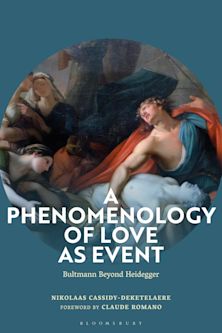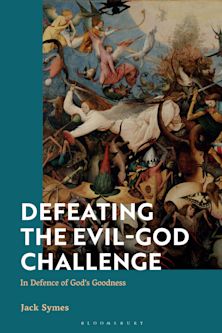- Home
- ACADEMIC
- Philosophy
- Philosophy of Religion
- Melancholy and the Otherness of God
Melancholy and the Otherness of God
A Study in the Genealogy, Hermeneutics, and Therapeutics of Depression
Melancholy and the Otherness of God
A Study in the Genealogy, Hermeneutics, and Therapeutics of Depression
You must sign in to add this item to your wishlist. Please sign in or create an account
Description
An impressive study that prompts the reader toward philosophical reflection on the hermeneutics of melancholy in its relation to maturing theological understanding and cultivation of a profound self-consciousness. Melancholy has been interpreted as a deadly sin or demonic temptation to non-being, yet its history of interpretation reveals a progressive coming to terms with the dark mood that ultimately unveils it as the self's own ground and a trace of the abysmal nature of God. The book advances two provocative claims: that far from being a contingent condition, melancholy has been progressively acknowledged as constitutive of subjectivity as such, a trace of divine otherness and pathos, and that the effort to transcend melancholy-like Perseus vanquishing Medusa-is a necessary labor of maturing self-consciousness. Reductive attempts to eliminate it, besides being dangerously utopian, risk overcoming the labor of the soul that makes us human. This study sets forth a rigorous scholarly argument that spans several disciplines, including philosophy, theology, psychology, and literary studies.
Table of Contents
Product details
| Published | 16 Dec 2011 |
|---|---|
| Format | Ebook (Epub & Mobi) |
| Edition | 1st |
| Extent | 240 |
| ISBN | 9780739166055 |
| Imprint | Lexington Books |
| Publisher | Bloomsbury Publishing |
About the contributors
Reviews
-
Feld’s Melancholy and the Otherness of God wholly recreates melancholy into a comprehensive sickness of our soul by way of a reenactment of our deepest philosophical and theological thinking. Now everything is not only centered upon the sickness unto death but that sickness is drawn forth as our deepest and most ultimate condition, yet a condition that is not simply a negative condition but one making possible renewal and rebirth, and renewal precisely by way of melancholy itself, a melancholy that is an ultimate depression, but a depression open to a profound reversal.
Thomas J. J. Altizer, radical theologian, professor emeritus, SUNY Stony Brook
-
Alina Feld's book admirably fills a gap in offering its reader a work covering the wealth of possibilities associated with melancholy. It is a well informed and intelligent study rich with impressive erudition and covering an intellectual and historical field from the ancients to the moderns. It offers us a treasure trove of attitudes and understandings concerning melancholy, deftly engaging the reader from premoderns theories of the humors all the way to postmodern depression. While dealing with the darker moods it is not itself dark but illuminating. It is not devoid of a leavening touch of Dante-like wisdom that reminds us that descent into hell precedes return to the surface of the earth and ascent to the things that are above us.
William Desmond, David Cook Chair in Philosophy, Villanova University; Thomas A.F. Kelly Visiting Chair in Philosophy, Maynooth University, Ireland; and professor of philosophy emeritus, Institute of Philosophy, KU Leuven, Belgium
-
In this richly detailed, historical analysis of the complex of depression, acedia, and melancholy in different languages and literatures throughout the entire tradition, Alina Feld returns behind the modern views of the subject in Descartes, Kant and their descendants. Her main aims lie in determining if earlier views help us in revising our modern views and, ultimately, to cast light on what it means to be human. The result is an interesting, unusual, and thought-provoking book.
Tom Rockmore, Duquesne University
-
With an extraordinary breath of learning drawn from philosophy, theology, mythology and medicine, Alina Feld demonstrates how melancholy relates to the big questions of Being, Time and God. She brilliantly argues that melancholic pathos is not reducible to purely social or psychological factors but is a primordial and perduring condition of human existence. In an age when depression has become one of our greatest ills, Feld recommends that we fully assume our melancholic condition in a labor of self-transformation. To face the nothing concealed in the depths of the self and the abyssal otherness of God, is, she claims, a crucial task for human beings – for a world without melancholy is not a human world. To this end both medicine and theology may be conjoined in a wise therapeutics of the dark soul.
Richard Kearney, Charles Seelig Professor of Philosophy, Boston College
-
Melancholy and the Otherness of God is a truly exceptional work, without parallel, so far as I know, in philosophy, theology, or comparative literature. The author, Alina Feld, brilliantly navigates the history of melancholy and its related manifestations in Western tradition, from the ancients in classical and medieval philosophy, theology, and mysticism, through the major figures in German Idealism and contemporary reflections on the nature of God and the human condition in Continental existentialism and phenomenology. She accomplishes this not only by way of an encyclopedic survey of the relevant literature, but weaves her analysis through mythology, art, and medical science by way of refined hermeneutical and methodological skills. Few writers today have the ability and talent required to master the complex interface between philosophy, theology, psychology, and literary art as is evident in this work. Melancholy and the Otherness of God is a breathtaking tour de force and surely will be considered required reading for all who venture into the frequently trivialized realm of melancholy and depression as these conditions bear upon the nature of consciousness, being human, and experience of the otherness of the Absolute.
Alan M. Olson, Boston University
-
This intellectually exhilarating book will leave even its most competent readers gasping for mindful breath. A comprehensive recovery of the ‘moods’ of the human condition, the work centers on the hermeneutics of ‘depression’ and its historical precedent surrogates (melancholia, sadness, ennui, carelessness, etc.) together with their ontologic/meontologic substrata. From the ancient Greeks (in both medicine and philosophy) through Heidegger and Michel Henry, no philosophical stone is left unturned. To stunning historical anamnesis the author brings her own critical thinking admirably to bear, and sets the highest possible standard for all subsequent work on this now clearly evident—and not uniquely modern or postmodern—human condition.
Ray L. Hart, Boston University

ONLINE RESOURCES
Bloomsbury Collections
This book is available on Bloomsbury Collections where your library has access.



































